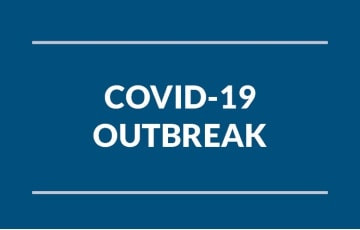Outpatient Treatment for COVID-19
一种新的治疗方法,用于防止恶化的症状of COVID-19 is now available at Island Health for vulnerable patients who have mild to moderate COVID-19 infection.
Amonoclonal antibody therapy, Sotrovimab, is available for administration intravenously at infusion clinics located at the Royal Jubilee Hospital in Victoria, Nanaimo Regional General Hospital and Campbell River Hospital. Other oral antiviral medications will be available soon for certain eligible patients.
To be effective, this treatment must be given very early in the course of illness, preferably within five to seven days of symptom onset.
-
What is Sotrovimab?
-
A new monoclonal antibody treatment called Sotrovimab was recently approved by Health Canada. Sotrovimab is a type of protein that neutralizes the spike protein of the COVID-19 virus, preventing the virus from entering and infecting healthy cells within your body. Sotrovimab is active against variants of concern Alpha to Delta. Sotrovimab is effective when used to treat all prior variants of concern and evidence thus far indicates that it is also active against the Omicron variant of SARS-CoV-2.
-
Who is eligible for Sotrovimab therapy?
-
- First, you must have had a positive Covid test, either a PCR test or a rapid antigen test, with proof of positivity. If a rapid antigen test was used, you must be registered on the BC website or have other proof of a positive test.
- In order to be eligible, you must be assessed within six days of symptom onset. The infusion must be administered on or before your seventh day of symptoms.
- Sotrovimab has been evaluated in COVID-19 patients who are mildly ill and has received health Canada approval under an interim order for use in this patient population.
To be eligible, patients must be at high risk for COVID-19 progression to hospitalization or death and must fall into one of the three following categories:
- Over age 55 and unvaccinated, or inadequately vaccinated.
- Between 12 and 55 years, unvaccinated or inadequately vaccinated, at increased risk for progression to severe disease due to a comorbid condition such as:
- Congestive heart failure (New York Heart Association class II, III, or IV)
- Chronic Kidney Disease (GFR <60)
- Chronic Respiratory Disease (COPD or moderate-severe asthma)
- Diabetes (taking oral medication or insulin)
- Obesity (BMI>30)
- Other medical conditions including pregnancy, prior organ transplant, sickle cell disease, Down syndrome, and other forms of immunosuppression and immunodeficiency
- Clinically extremely vulnerable patients, regardless of vaccination status, who are unlikely to adequately respond to vaccination because they:
- Are undergoing active treatment for solid tumor or hematological malignancies within the last year
- Received a solid organ transplant and ongoing treatment with immunosuppressive medications
- Had CAR-T cell therapy or hematopoietic stem cell transplant in the last two years
- Are having a moderate to severe primary immunodeficiency
- Have advanced untreated HIV or AIDS
- Have an autoimmune or inflammatory condition requiring treatment with any systemic immunosuppressive therapy within the past year (monoclonal antibody therapy, high-dose prednisone, cyclophosphamide, methotrexate)
-
What does the treatment look like?
-
Sotrovimab is administered by intravenous infusion by a qualified healthcare professional and takes approximately 60 minutes. After the infusion a patient is monitored for another 60 minutes for any potential side effects or transfusion reactions. Most patients tolerate the treatment extremely well.
Sotrovimab clinical practice guide.
-
What to expect after the infusion
-
- A follow-up telephone appointment with a clinic physician will be scheduled for two days post infusion to review your status.
- Some patients may have home oxygen monitoring arranged at the time of discharge.
- Most patients with mild illness do not progress to severe disease. Receiving Sotrovimab reduces the risk of progression by nearly 80%.
- If your symptoms worsen or you have any questions or concerns you can either contact the OCTC nurse during clinic hours or call your primary care provider. If neither are available, you can call 8-1-1.
- Go to an urgent care clinic, emergency department, or call 9-1-1 if you: have difficulty breathing, have chest pain, can’t drink, feel very sick, feel confused, or experience any loss of consciousness.
-
How to book an appointment?
-
If you have a COVID-19 infection and meet the above criteria, please call theOutpatient COVID-19 Therapeutics Clinicat 250-737-2030, extension 44685.
If eligible, you will have a telehealth (by phone) appointment scheduled with a health-care provider for further evaluation. If treatment is offered to you and you agreed to proceed, an infusion time will be scheduled at the nearestMonoclonal Antibody Infusion Clinicto you.
These clinics are located at the Royal Jubilee Hospital in Victoria, Nanaimo Regional General Hospital, and Campbell River Hospital.
-
Next steps and future access
-
Island health is making every effort to ensure timely and fair access for all patients who qualify to receive COVID-19 therapies. However, given geographic constraints and pandemic pressures it is impossible to have this therapy readily available for all patients given the time constraints for administration. As new oral antiviral drugs become available the OCTC will have other treatment options which will improve access to these important therapies.



